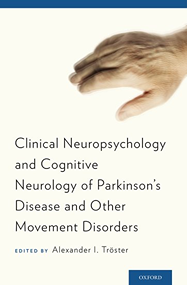Clinical Neuropsychology and Cognitive Neurology of Parkinson's Disease and other Movement Disorders
Material type: TextLanguage: English Publication details: Oxford : Oxford University Press, c2015Description: XII, 546 p. : illISBN:
TextLanguage: English Publication details: Oxford : Oxford University Press, c2015Description: XII, 546 p. : illISBN: - 9780199812370
- 616.833 TRO
| Item type | Current library | Shelving location | Call number | Copy number | Status | Date due | Barcode |
|---|---|---|---|---|---|---|---|
 Reference Collection
Reference Collection
|
LEJ Campus Library | LEJ Campus | 616.833 TRO | 2022-23 | Available | 98199 |
Alexander I. Troster
Dr. Alexander Tröster's clinical and research interests include movement disorders, cognition, and deep brain stimulation. He has authored more than 180 scientific articles, medical journal articles, and book chapters, and his contributions have been recognized with fellowships from the National Academy of Neuropsychology and the American Psychological Association. A past president of the National Academy of Neuropsychology, he is the recipient of their Distinguished Scientific Contributions to Clinical Neuropsychology and Early Career Achievement awards. He serves on the editorial boards of five journals and several advisory boards.
SUMMARY:
The book provides an up-to-date account of the neuropsychological, cognitive-neurological, and neuropsychiatric aspects of movement disorders. The past ten years have seen an explosion of research covering non-motor aspects of Parkinson's disease and, more recently, movement disorders such as essential tremor, dystonia, corticobasal syndrome, progressive supranuclear palsy, and multiple system atrophy. It is often these neurobehavioral features that become troubling to the patient: they are sometimes difficult to recognize and treat, are associated with diminished patient and caregiver quality of life, and may hasten disease progression, loss of independence, and institutionalization. This book discusses the most recent diagnostic and treatment guidelines for such cognitive and psychiatric conditions in Parkinson's disease and other movement disorders, while providing practical tips and strategies for general assessment.
The rapid accumulation of research in this field makes it increasingly difficult for one or two people to author a comprehensive text in an expert manner. The world-class team assembled for this volume succeeds in covering widely diverse areas such as the pathology, neuroimaging, assessment, and treatment of an ever-growing set of neurobehavioral features of movement disorders — cognitive impairment and dementia, depression, apathy, anxiety, psychosis, and impulse control disorders. The text also surveys fundamental knowledge about basal ganglia function and dysfunction, assessment and evaluation techniques applicable to a range of movement disorders, and quality of life issues more broadly.
